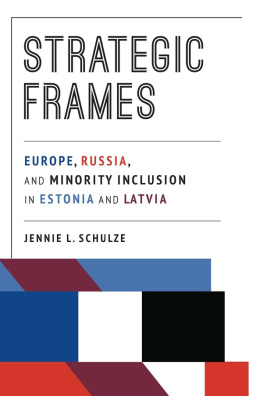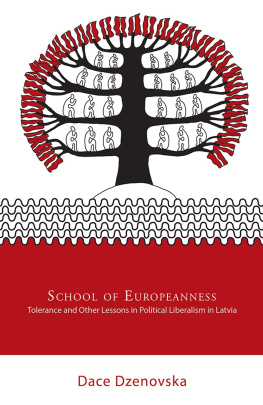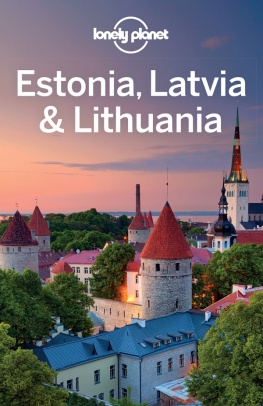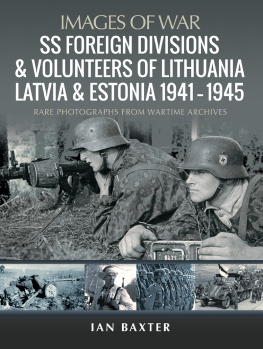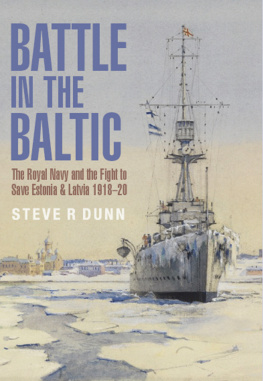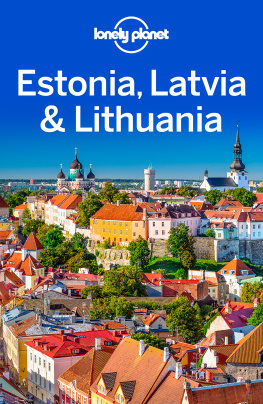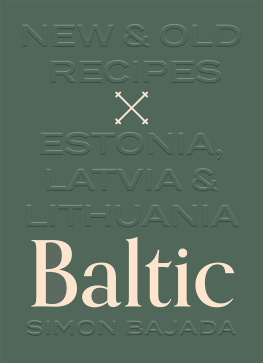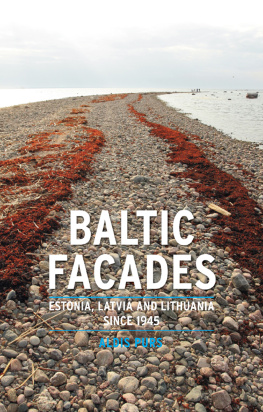ACKNOWLEDGMENTS
The road to the completion of this book has been long and therefore the debts owed are great. I begin by thanking faculty, friends, and mentors at The George Washington University. It was there that my interest in Russian-speakers in the Baltic states began with my doctoral thesis. Over the years, the members of my committee have been an infinite source of encouragement, critical and constructive feedback, and insight into the relations among European institutions, kin-states, resident states, and minorities in the post-communist world. I thank James Goldgeier for believing in the project, teaching me how to be a more effective writer, guiding me through the job market and publishing, and for all his sage advice through the years. I thank Henry Hale for helping to prepare me for my fieldwork and for his boundless positivity. Most importantly, I appreciate the careful attention, critical perspective, and insightful feedback he gave to every draft I sent, and for his generosity in continuing to offer invaluable advice on research and publishing. Last but certainly not least, I thank Zsuzsa Csergo for inspiring me to study nationalism, for always pushing me to ask harder questions and to embrace fresh perspectives, for reading numerous drafts, and for giving me endless advice on the job market, publishing, and achieving worklife balance. The generosity she has shown me with her time, knowledge, and friendship is a model of mentorship I can only hope to one day emulate. I would also like to thank Martha Finnemore, Deborah Avant, and Daina Eglitis. They were extremely generous with their time in helping me to think through my project and in offering constructive feedback. I also thank my friends, who read early drafts and provided tremendous support, especially Maryam Deloffre and Jacob Berg.
This book would not have been possible without the generosity, assistance, and friendship of so many colleagues in Estonia and Latvia. I begin by thanking Raivo Vetik for giving me the opportunity to contribute to The Integration of the European Second Generation (TIES) project in Estonia. Living and working in Estonia for such an extended period was invaluable for my development as a Baltic scholar. It enabled me to conduct my own research and to immerse myself in these societies. I would also like to acknowledge all the other researchers at Tallinn University and the University of Tartu who provided feedback on research instruments and helped me to make contact with respondents. The stimulating conversations that I had with each of you helped to shape my thinking on this project in so many important ways. I thank the following persons for either providing critical feedback on earlier drafts, or for helping me to navigate the world of Estonian and Latvian politics. If I have overlooked anyone, please forgive my omission. I thank Gerli Nimmerfeldt, Pille Petersoo, Vello Pettai, Eva Maria-Asari, Klara Hallik, Andres Kesakamp, Klliki Seppel, Rune Holmgaard Andersen, Timofey Agarin, Daunis Auers, Nils Muinieks, Boriss Cilevis, Rasma Karklins, Lars Johannssen, and Kijetil Duvold. I also would like to thank Jon Ender at the Estonian Research Institute, and Brigita Zepa at the Baltic Institute of Social Sciences for overseeing translation on this project and providing crucial research support. Special thanks is also owed to my graduate assistants at various institutions who provided crucial research support, particularly Nastja Sokolova, Pteris Nalivaiko, and Annette Mackay. Finally, I thank my respondents without whom this research project would not have been possible. While they remain anonymous, I am indebted to them for giving their time to speak openly with me.
Other colleagues have also been an invaluable source of inspiration, feedback, and support throughout this process. I would like to thank Lowell Barrington, Julie George, Cynthia Kaplan, Patrice McMahon, Ada Regelmann, Philippe Roseberry, Oxana Shevel, Sherrill Stroschein, and Myra Waterbury for helpful comments on earlier drafts. I thank the editorial staff at the University of Pittsburgh Press, particularly Peter Kracht, Jonathan Harris, and Alex Wolfe for their enthusiasm for the project, valuable feedback, and guidance along the way. Finally, I thank the anonymous reviewers of the manuscript for their careful reading and constructive feedback.
At Duquesne University, I am privileged to have supportive colleagues. I thank Patricia Dunham for her friendship, encouragement, and assistance in securing funding, as well as Charles Rubin and Lewis Irwin for their advice and support. I thank Clifford Bob for generously reading draft proposals, offering invaluable advice on publishing, and holding me to deadlines. I would especially like to acknowledge Mark Haas, who has been a tremendous source of knowledge, support, and guidance throughout the writing and publishing process, and whose positivity and friendship have been invaluable.
This research project would not have been possible without generous funding from many sources, including the European Unions Marie Curie Fellowship, as well as grants from the European Union Studies Association, the Association for the Advancement of Baltic Studies, the Association for Women in Science, and the Institute for European, Russian, and Eurasian Studies at The George Washington University. Duquesne University has also provided financial support through grants from the Severino A. Russo Endowed Faculty Development Award and the Presidential Scholarship Award. Financial support from the political science department and the McAnulty College and Graduate School of Liberal Arts has also been crucial for helping me to complete the project.
The love and support of my family has been incredible throughout the lengthy research and writing process. I thank my parents and brother for always understanding my love of Eastern Europe, for visiting me during my fieldwork, and for believing I would eventually finish this book. Most of all, I thank my husband Marko Vujicic for being on this journey with me from the very beginning. I thank him for moving to Estonia with me and for falling in love with the country. I thank him for accompanying me on trips to Latvia, listening patiently about the project, and always providing constructive feedback. Most importantly, I thank him for being such a wonderful father to our three beautiful boys while I spent long days writing. I so look forward to taking our sons Luka, Emmett, and Sawyer to Estonia and Latvia so that they too can fall in love with these places that are so close to our hearts. I dedicate this book to Marko and our boys.
PARTIES AND PARLIAMENTARY FACTIONS IN ESTONIA AND LATVIA
PARTIES/ELECTORAL COALITIONS AND PARLIAMENTARY FACTIONS IN ESTONIA
VII RIIGIKOGU (SEPTEMBER 30, 1992MARCH 10, 1995)
Parties/Electoral Coalitions Represented
IsamaaElection Coalition Pro Patria
Kindel KoduElection Coalition Safe Home
RahvarinneElection Coalition Popular Front
MdukadElection Coalition Moderates
Eesti Rahvusliku Sltumatuse ParteiEstonian National Independence Party
Sltumatud KuningriiklasedElection Coalition Independent Royalists

